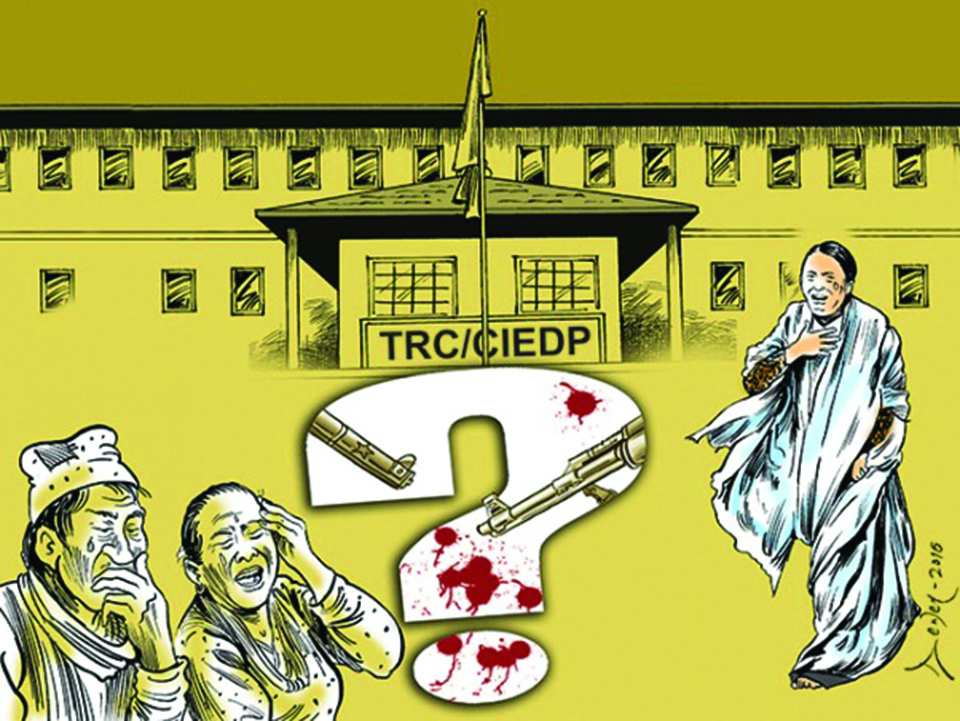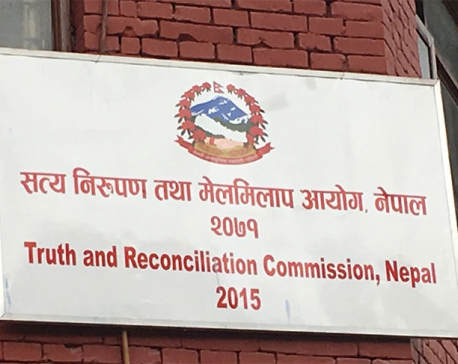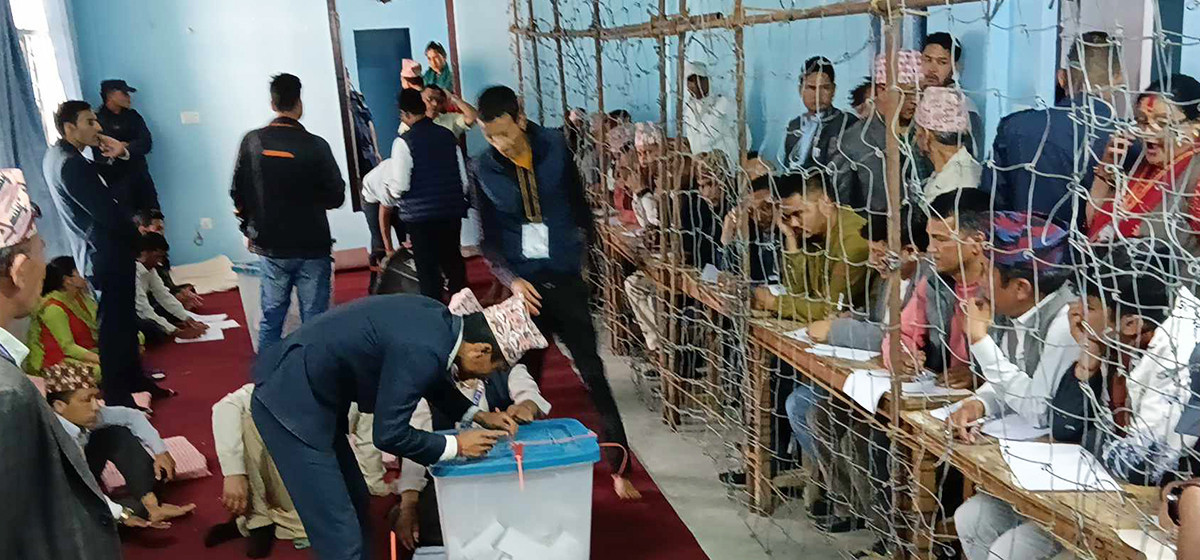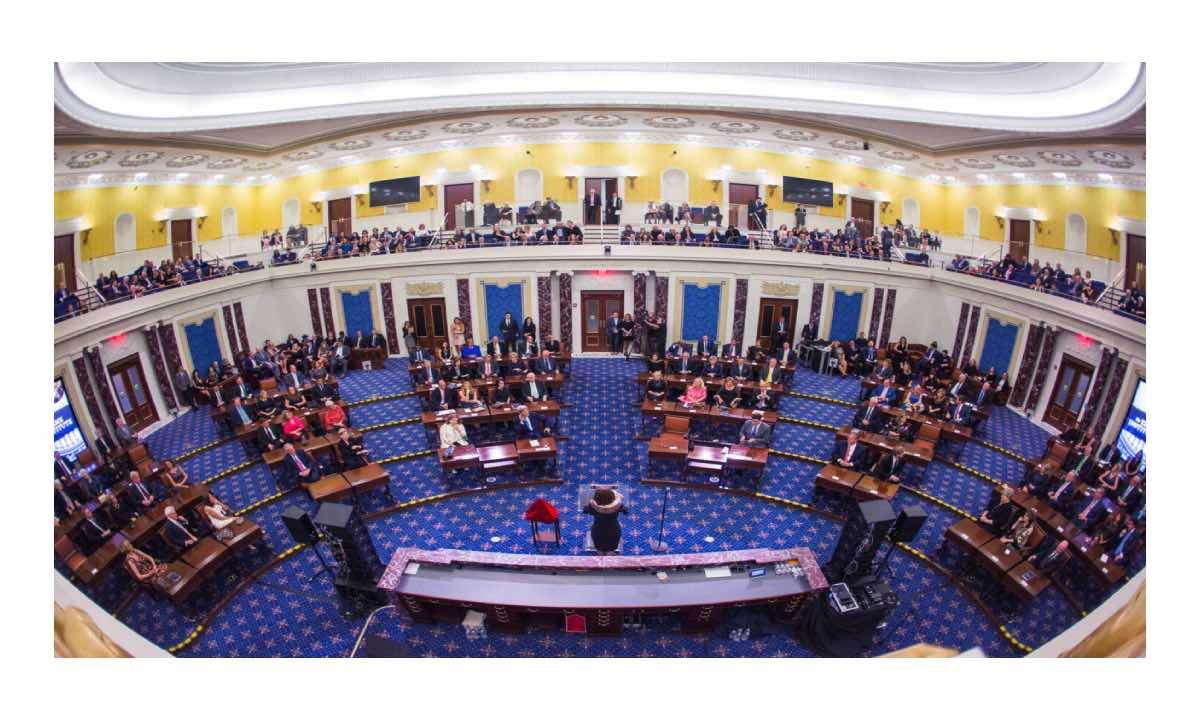
OR
TRC and CIEDP remain without office-bearers for a year
Published On: August 17, 2023 06:00 PM NPT By: Bhasa Sharma

KATHMANDU, Aug 17: The Truth and Reconciliation Commission (TRC) and the Commission on the Investigation of Enforced Disappeared Persons (CIEDP) which were set up to address transitional justice issues, have been without office-bearers for a year. The employees of these two commissions are forced to spend their days without work, just marking their attendance.
These two commissions have been without an office-bearer since mid-July, 2022. The government is not concerned even though there has been no office-bearer for a year and the employees have become ‘jobless’. The employees of both commissions became taskless as there is a legal provision that the employees work under the decision of the office-bearers of the commission. The employees of both commissions which consist of the five-member including the chairman have been demanding to be transferred elsewhere after not getting any task.
The victims of the armed conflict are still waiting for justice for 16.5 years after the Comprehensive Peace Accord (CPA). From time to time, the government continues to bring up the issue of addressing transitional justice. Earlier, after filing a case against Prime Minister Pushpa Kamal Dahal in the Supreme Court (SC), there was pressure to move forward the stalled amendment bill, now that too has been shelved.
The bill to amend the Commission on Investigation of Disappeared Persons, Truth and Reconciliation, 2071 (2014) is stalled in parliament. On the other hand, it is seen that office-bearers cannot be appointed to the commissions until the bill is passed. It is not yet decided when the government will appoint the office-bearers and when the employees working there will get some work to do.
Even after 16 years of the CPA in the country, the conflict victims have not been able to get justice because the government has not prioritized transitional justice. The international community has also been showing interest from time to time stating that transitional justice has not been addressed.
With the aim of ending the armed conflict in Nepal from 2052 BS to 2063 BS and establishing lasting peace in the country, a CPA was signed between the government and the then CPN-Maoist on November 21, 2006. In the CPA, it was mentioned that a high-level commission will be formed to investigate the truth of serious violations of human rights during the armed conflict, those involved in crimes against humanity and to create an atmosphere for reconciliation.
Eight years after the peace agreement, a CIEDP was formed. Employees who are recruited in the commission are shirking their responsibilities citing the provisions of law. Transitional justice has not been delivered even after 16 years of the peace agreement because the government does not prioritize it and this has resulted in a lack of trust of the conflict victims in the commissions.
Two commissions have been formed with the aim of investigating the truth about the serious violations of human rights during the armed conflict and bringing the real facts to the public.
These commissions were tasked with creating an atmosphere of sustainable peace and reconciliation by promoting mutual harmony and tolerance between the perpetrators and victims of armed conflicts. The commissions are responsible for arranging compensation for the victims of the armed conflict and recommending to the Government of Nepal for legal action against those involved in serious crimes.
But the office-bearers recruited to these two commissions have not been able to do that work accordingly. In the year 2071 BS, a committee was formed under the chairmanship of former Chief Justice Om Bhakta Shrestha to recommend office-bearers in two commissions. Based on the recommendations of the committee, the office-bearers were appointed under the chairmanship of Surya Kiran Gurung in the TRC and Lokendra Mallik in the CIEDP.
The office-bearers appointed for the first term could not perform the assigned work. After that, they were dismissed for the second tenure. At the same time, more than 63,000 complaints of conflict victims were registered in the TRC.
There are 3,288 complaints registered in the CIEDP. Out of that 277 complaints have been sent to the TRC. So far, the CIEDP has not been able to do anything other than distributing identity cards to the victims.
After that, the government formed a recommendation committee for the second time under the chairmanship of former Chief Justice Om Prakash Mishra to appoint office-bearers to the two commissions. In the year 2076 BS, the committee appointed office-bearers under the chairmanship of Ganesh Dutta Bhatta in the TRC and Yuvraj Subedi in the CIEDP. However, the office-bearers of both the commissions were dismissed because they could not perform the assigned work.
Conflict victims have already filed a writ petition at the SC demanding that provisions should be amended which states the employees of the two commissions cannot investigate the complaints until the office-bearers are appointed.
There is a demand in the writ petition to continue the work related to the necessary investigation on the complaints of the conflict victims. The victims demand, “As per the legal provisions in the CIEDP and TRC Act, 2071, let a mandamus be issued in the name of the defendants to continue the task by appointing five office-bearers including the chairman each to the TRC and CIEDP immediately in accordance with the judgment of the Supreme Court and the legal provisions.” The writ petition is pending at the SC.
Nine years ago, the SC ordered the repeal and amendment to the subsections of the two sections of the CIEDP.
“The provisions made in the two subsections of the Act are deemed to be void as of today's date as they are found to be contrary to Articles 12, 13, 24 and 135 of the Interim Constitution of Nepal,” said the SC. But the order of the SC has not yet been implemented.
You May Like This

Panel proposes Bhatta for TRC head, Mallick for CIEDP chief
KATHMANDU, Nov 18: A committee formed to recommend chiefs and members in the two transitional justice (TJ) bodies has named Ganesh... Read More...

Recommendation committee to unveil TRC, CIEDP office-bearers' names on Monday
KATHMANDU, Nov 17: The meeting of the committee formed to recommend the names of the officer-bearers for the Truth and... Read More...

Heed the voice of disabled civilian war victims: Lalitpur Declaration
KATHMANDU, Feb 20: Following the one-year term extension of transitional justice (TJ) bodies, victims of the decade-long Maoist insurgency have demanded... Read More...






Just In
- Demystifying labeled Feminism
- Japanese Foreign Minister to visit Nepal next week
- Bajhang by-election update: NC candidate ahead by 249 votes
- Aid for war: On the United States Senate and aid package
- NEA Provincial Office initiates contract termination process with six companies
- Nepal's ready-made garment exports soar to over 9 billion rupees
- Vote count update: UML candidate continues to maintain lead in Bajhang
- Govt to provide up to Rs 500,000 for building houses affected by natural calamities












Leave A Comment